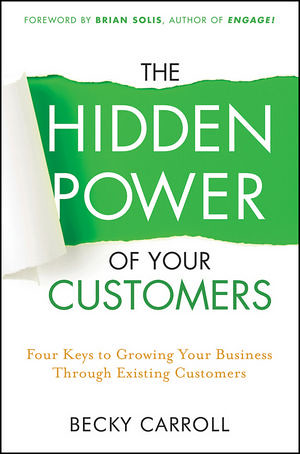
It’s not a widely kept secret, but customers do indeed keep companies in business. While businesses have long invested in improving customer relationships, the time has come to think beyond efficiencies and automation and examine new opportunities to rethink customer experiences overall. Why? Customers are more connected than ever before. The role they play has exploded beyond transactions and is now influencing the transactions of others as well as contributing to the brand experience at levels never before seen.
It’s said that your brand is defined by what your customers and employees say when you’re not in the room. Well, the proverbial room has now taken center stage on the social web and as a result, your brand is indeed shaped by the words and experiences of your customers and those who influence them. The future of business isn’t created, it’s co-created.
My good friend Becky Carroll just published her new book and I was honored to write the foreword. The team at Wiley has given us permission to share it with you here. If you get a chance, please take a look at “The Hidden Power of Your Customers: Four Keys to Growing your Business Through Existing Customers.”
The Rise of the Connected Customer and the New Era of Relevance
Good customer service used to be one of the secrets to business success. Over time, however, what was considered “good” turned out to be not good enough. Somewhere along the way, customers became a burden, viewed by big organizations as a cost center and by smaller businesses as an inconvenience. Processes, systems, automated attendants, and technology eventually separated us from them and … well, here we are today, wondering how it is that the very people who contribute to the overall health of our business are farther away from us than ever before.
Let me ask you a question: When you picture customer service, do you see it from the standpoint of you as a business owner or stakeholder in a company, or do you think of it from the customer perspective, where your experiences as a customer remind you of what good service is and isn’t? I have to be honest, writing this brought to mind some painful experiences, when I just didn’t feel the appreciation I would expect as a customer. I have a feeling it’s an experience you and I share. That’s the point. As customers, we can share countless stories of unpleasant encounters—and have most likely already done so with our friends and family. How many great customer service experiences can you recall, and how often did you, or do you, talk about them today?
This is the perspective you need as you look to your customers today to grow your business tomorrow. This may sound silly, but the future of business takes a personal touch.
Let me share a secret with you, a secret that will unlock the four keys to growing your business: Empathy is the connection between you and your customers. Empathy is the bridge between your customers and their peers.
I’ve known Becky Carroll for several years, and the message of empathy is one she has shared with us time and time again. As so many relationships begin these days, I initially “met” Becky online, through Facebook, Twitter, and blogs. In February 2008, I had a chance to see her in action at “The Customer Service Is the New Marketing Summit,” hosted by GetSatisfaction in San Francisco. Becky’s session was titled “Customer Experience: The Intersection of Marketing and Customer Service,” and her words still echo true today.
Great—not just good—customer service is necessary for business survival. Personalized and empowering customer service, fanned by empathy, is the recipe for viral customer service, where word of mouth becomes an extension of your marketing and sales efforts.
The future of business is rooted in shared experiences. Customer experiences will be shared, and they will either be positive or negative. Not unlike the reviews we’ve either posted or read on Amazon, people either love or hate an interaction they’ve had with a company. They feel so strongly about it, they’ll take to Amazon or any other review site to ensure that everyone else feels what they’re feeling prior to making a purchase decision. Again, customer experiences will either be positive or negative, and you can bet that they will be shared.
The wonderful aspect about all this is that you get to choose which type of experience your customers will have. More important, if you can engender a positive experience for them, you can literally plug into an entirely new world of connected consumerism that extends those exchanges beyond the typical few friends they might tell either way. Nowadays, customers are connected to one another through social networks and online groups. This isn’t new; what is new is the nature of these relationships and the efficiency with which information travels within and beyond inner networks of friends.
The average person is connected to 140 people on Twitter and 130 on Facebook, and even they can trigger a social effect that extends experiences beyond small cliques of friends and family. There’s a new genre of customers rapidly emerging, and they’re connected to not hundreds but thousands of others. The social or connected customers is your influencer. They are the gatekeepers to a more efficient and expansive network of referrals linked by shared experiences and optimized through an endless social effect that extends your value proposition beyond your reach today. Yes, that was a long sentence, but I couldn’t shorten it, as doing so would have minimized the importance of what’s before you.
We are embarking upon a new era of business, one that I believe represents the end of business as usual—and this is a good thing.
Customers want a few things:
• Products or services that meet or exceed their needs.
• The ability to find what they need when they need it.
• A channel by which to be heard.
What customers now bring to the table is the ability to get each of the above with or without you. This is your opportunity to plug in to these networks, where you can build relationships, cultivate loyalty, and learn how to adapt, all while earning greater relevance and reach. Brilliant!
Everything begins with defining the experiences you wish others to share.
There’s a mnemonic spelling lesson in English most of us learned that, to this day, is impossible to forget: “i” before “e” except after “c.” It can, however, be applied to much more than everyday spelling. To remember the importance of the customer, I’ve adapted its definition as follows:
Insight before engagement unless customer or community needs take immediate precedence.
With the emergence of social media, we are given not just a right to engage but a rite of passage to earn relevance.
Social networks are much more than Twitter, Facebook, Foursquare, YouTube, et al. These networks represent a potential much more transformative: that is, the democratization of information and the equalization of influence within new digital societies. Here, everyone begins at ground zero, including you, but it is how behavior evolves that introduces us to a new future of sales, service, and business. As everyday sales and service become commodities, experiences and relationships become paramount. Peers, friends, family, and experts become trusted sources to steer and filter relationships within these new landscapes. Sharing becomes social. Decisions become social. Commerce, and ultimately service, becomes social. At the heart and soul of all of this is the very essence of your business—shared experiences connected through empathy and fortified by the desire and intention to shape them in ways that help people help you.
Take this book and use it to grow your business. More important, use it to build relationships that turn customers into advocates and advisors.
In business, as in life, you earn the relationships and, with nurture, the yield that you’ve earned and deserve.
Care. Guide. Connect. Learn.
Brian Solis (@briansolis), author of The End of Business as Usual and Engage!, digital analyst, and champion for everyday customers
____
Connect with Brian Solis on Twitter | LinkedIn | Facebook | Google+





@briansolis:twitter do you think that companies must be conscience in building programs that will allow their customer service departments the flexibility of managing customer issues (completely)? With that said are customer services departments being given the tools to turn customers into ambassadors or at the very least company/brand advocates?
What does that landscape look like?
I envision an image of a horseshoe…with customer service at one tip and social media at the other. The future of this is connecting the gap so that social media feeds service in a way that matches the needs and expectations of the social customer. But that requires a different approach to customer service with a new sense of metrics and rewards.
I absolutely think they do. The question is are they going to do it? I
think we are seeing only a few companies actually embracing social media
to engage and connect with their advocates. I think if they forget so
much about the ROI and the analytics, and just jump in and get their
feet wet to see if there’s any positive result, which other companies
have proven already, they can embrace it fully and keep the programs in
place.
It has to start somewhere right?
Customer service is very vital to any business. Any good business already knows that the customer having a positive experience at your place of business will result in loyalty among other good emotions from consumer to business. The place that many businesses go wrong in my opinion is in social media efforts. Everyone feels that social media is important but not all businesses follow up with resources that are made avalable to them online at no cost or little no cost.
Yeah if you want to get success in your business you should to two things maintain quality and provide the best possible services to your customers. In this way the number of your customers will increase and you can do a good business.
Straight from the heart it seems. That’s adding a whole lot more of passion – Everything begins with defining the experiences you wish others to share.
nice rise of the connected customer
buy deals everyday,hot deals shopping, cheapest travel packages,discount online store, cheapest travel package, shopping at atlanta
Brian, I share your secret. Understanding the customer’s concerns humanizes the context
of the online experience. A good experience is what makes customers emotionally
connect with the brand and share their experience with others.
Thank you all for your interest in this subject, and thank you Brian for writing the foreword to my book!
It is definitely about more than just customer service (that is not enough); unlocking the power in our customer relationships comes through the whole customer experience, including marketing, sales, the actual product experience, and interactions with other customers around the product.
It is also about more than just social media. Social media is a great channel to build relationships with our existing customers, but there are so many more touch points that just SM. That said, social media can help provide an underpinning of engagement throughout the experience – if your customers use it!
Thanks again – you all rock!
Empathy = understanding another person’s world is key to influence in person or print.
This is one of seven steps in Tony Robbin’s outstanding “Creating Lasting Change” course. For anyone looking to bone up on their ability to connect with another human, this course teamed up with this book would be a tag team – Boom Shaka Laka Style!!!
Amazing stuff,Thanks so much for this!This is very useful post for me. Thank you very much!
Most conversations around customer service today focus on social media as the new way to deliver customer service — kudos to Brian and Becky for broadening their scope and focusing on empathy in order to deliver exceptional service. It really is not about whether you respond to a negative tweet or Facebook wall post from a customer in 30 seconds, but it is really about customer enablement. Be obsessed with putting yourself in the shoes of your customer and focus on the mutually beneficial aspect of the relationship. Feel their pain and do your best to ameliorate it. Yes, they are paying you to deliver a service, but by meeting both their needs and wants you enable their success and build their loyalty.
Baxter
Hear hear!
The customers changed habit every day. We must know what is the trend also?